
Introduction
This subject guide was compiled in support of the International Youth Summit, organized by the Middle East Institute, in partnership with Southern Methodist University (SMU) and Howard University. The resources presented here will likely be useful to researchers of all levels who are interested in the various aspects of human rights.
Arranged in order of the topics covered in the Youth Summit, the goal of this guide is to provide the Summit’s participants with a stepping stone for launching their research on the various topics of the summit. The resources listed below include legal documents and databases, publications of intergovernmental organizations, non-profit organizations, and government departments and ministries. Although the main focus is on primary resource materials that are openly available online, search tips for library catalogs and a list of some relevant subscription databases are also provided. Through this resource guide, students of all levels will hopefully find primary and secondary resources that will help their research and educational development.
Resources listed under the first, general human rights section are broadly applicable to all subsequent sections. The Special Topic: Protest Movements & Free Speech is listed in the general section because it is a timely and popular area of interest that is not officially included in the Youth Summit schedule.
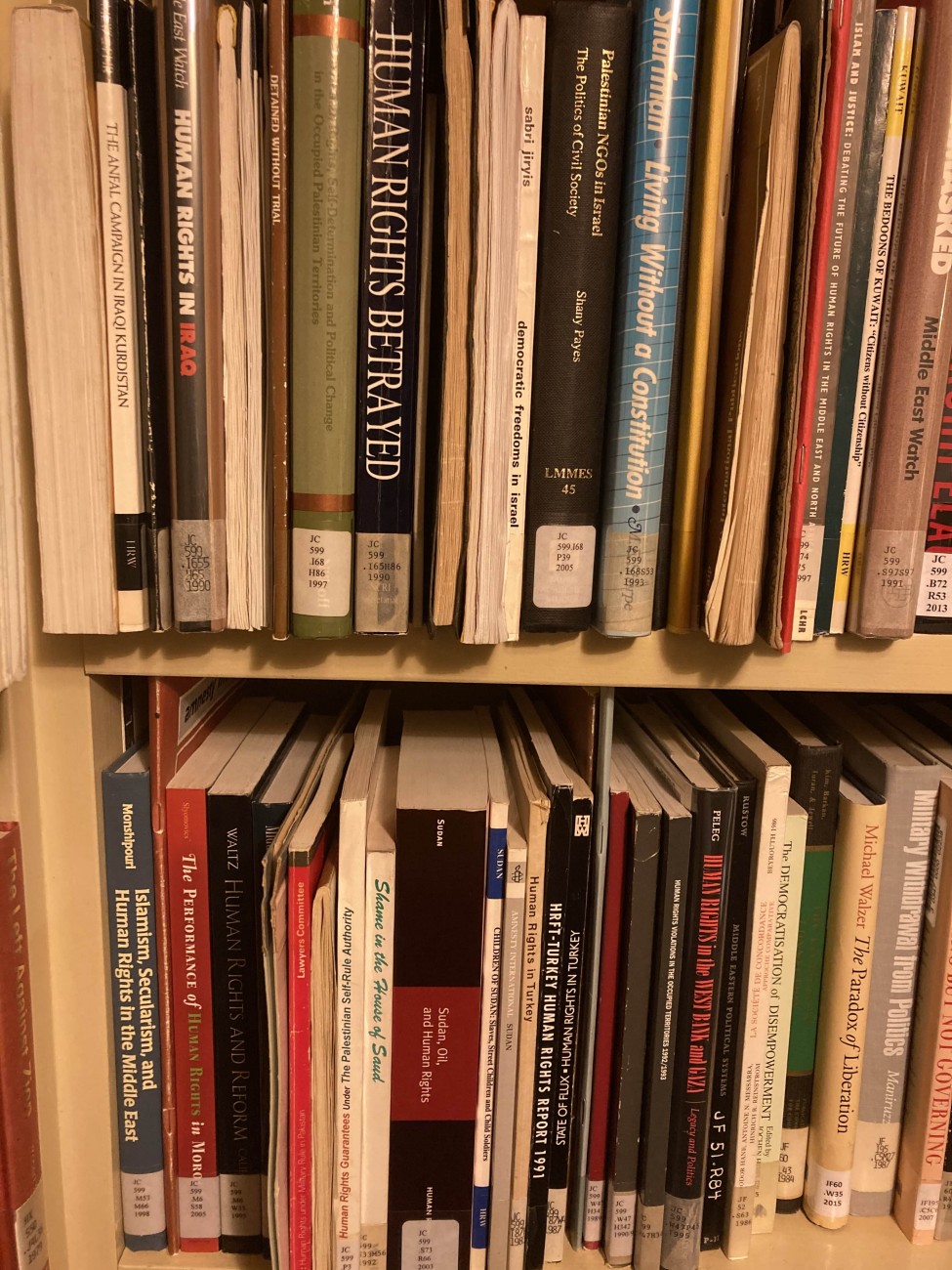
Contents
Human Rights: General Resources
- MEI Projects & Panel Discussions
- Search for Books by Subject in Your Library
- A Note on Bibliographies
- Resource Guides by Other Institutions
- Subscription Databases
- Open Access Databases & Other Resources
- Nonprofit Organizations
- European Union Resources
- United Nations Resources
- Human Rights Resources by Country
- Special Topic: Protest Movements & Free Speech
- MEI Projects, Publications & Panel Discussions
- Search for Books by Subject in Your Library
- Nonprofit Organizations
- Open Access Databases & Other Resources
- European Union Refugee Resources
- United Nations Refugee Resources
- Government Ministries & Departments
- MEI Projects, Publications, & Panel Discussions
- Search for Books by Subject in Your Library
- Nonprofit Organizations
- Open Access Databases & Other Resources
- European Union Gender Equality Resources
- United Nations Gender Equality Resources
- Government Ministries & Departments
Criminal Justice/Prison & Detention
- MEI Projects, Publications, & Panel Discussions
- Search for Books by Subject in Your Library
- Nonprofit Organizations
- Open Access Databases & Other Resources
- European Union Criminal Justice/Detention Resources
- United Nations Criminal Justice/Detention Resources
- Government Ministries & Departments
Human Rights: General Resources
This section lays out general resources relating to human rights (HR); it provides a broad introduction to catalogs, databases, and other websites that will help researchers interested in a wide variety of HR topics.
The purpose of this general section is to present information resources that may be applicable to a wide variety of specific topics related to human rights, leading researchers to discover relevant resources, including those that are not necessarily named in the other sections. It also seeks to enable students to see the “big picture” -- the context within which narrower topics lie.
MEI Projects, Publications, & Panel Discussions
Panel discussions and other similar events may serve not only as information resources in and of themselves, but they could prove useful for discovering others such as organizations, databases, books or journals, authors, and more.
MEI Human Rights Series: This initiative aims to bring together grassroots activists, global advocates, journalists, and academics, to discuss global human rights issues in the MENA region. It will feature experts from the region in virtual events and interviews that highlight the progress and setbacks to some of the major human rights issues affecting the area.
Human Rights in Times of Global Crises: Panel discussion, dated May 13, 2020.
Search MEI's website for any keyword to find podcasts, Zoom webinars, and publications including Special Briefings. Search the whole website, or limit searches by country, type, or program.
Checking the website and subscribing to event updates will keep you updated on future webinars.
Search for Books by Subject in Your Library...
...At the Oman Library at MEI, or in libraries worldwide, using authorized subject terms such as the ones listed below. Subject terms may be as broad or as specific as you need. They may be combined with other terms or used on their own. While simple keyword searches work, targeted searches provide more precise results. Although it is not officially a Library of Congress subject term, "Droits de l'homme" will likely provide fruitful results. Filter search results by language or other criteria, on the left-side menu.
Some examples for Library of Congress Subject Headings relating to Human rights:
Human rights
Civil rights
International law and human rights
Note: A combination of subject terms, including date ranges, may also be used, such as
Human rights--Africa, North
Human rights--Afghanistan*
Human rights--Middle East**
Human rights monitoring--Arab countries
Human rights--21st century
Human rights--1990-2000
Human rights--2000-2010
* “Afghanistan” can be replaced with any country name.
** The appearance of "--" in the example subject terms should not be typed into a subject or keyword search. Combine terms into different search boxes or the full term, without dashes, into the same search box. For example, Human rights--Middle East becomes simply Human rights Middle East.
The terms may also be searched in separate boxes, as in the second photo below, for the same results.

Combine search terms with Boolean operators in the simple/basic search with the use of quotation marks, or advanced search. Here are two examples of subject searches in WorldCat with Boolean operators, click the links to see the corresponding search results: civil rights AND arab spring; civil rights AND arab spring AND protest movements. The same or similar searches may be performed in your own university library catalog.
A Note on Bibliographies
Merriam-Webster defines a bibliography as
(1) the history, identification, or description of writings or publications
(2a) a list often with descriptive or critical notes of writings relating to a particular subject, period, or author a bibliography of modern poetry
(2b) a list of works written by an author or printed by a publishing house compiled a complete bibliography of John Donne
(3) the works or a list of the works referred to in a text or consulted by the author in its production
Bibliographies, in the library, will often be found in the Z call number sections if Library of Congress Classification System is used, or in the 010 and 011 sections by the Dewey Decimal Classification System. These books are the original Google/databases. Researchers have relied on them for decades--and continue to do so today--for finding invaluable resources on a wide variety of topics. The detail of the bibliographies varies widely; some may be annotated so that the reader is provided with detailed subject, publication, or holdings information, or they may be as simple as a list of all publications by one publisher, or on a certain topic. They may appear as stand-alone publications, parts of multi-volume sets, or as articles in scholarly journals. The example provided here is a journal article listing all 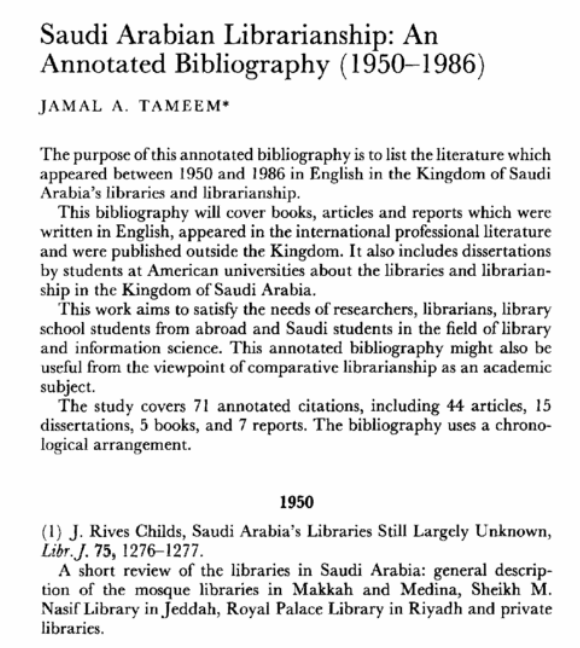 English language publications in Saudi Arabia, and internationally published works on a variety of topics relating to the Kingdom of Saudi Arabia (not just librarianship) for the time period of 1950-1986. National bibliographies, on the other hand, are usually large works produced by an official government organ, such as the National Library of Turkey (Archive 1923-2012), with the aim of recording all publications from that country within a certain time period.
English language publications in Saudi Arabia, and internationally published works on a variety of topics relating to the Kingdom of Saudi Arabia (not just librarianship) for the time period of 1950-1986. National bibliographies, on the other hand, are usually large works produced by an official government organ, such as the National Library of Turkey (Archive 1923-2012), with the aim of recording all publications from that country within a certain time period.
Due to its international nature, many books about human rights--regardless of language--include French subject headings. Some examples are listed below. Although a simple search in WorldCat for human rights--bibliographies as will return many results, an advanced search allows users to obtain more specific results.
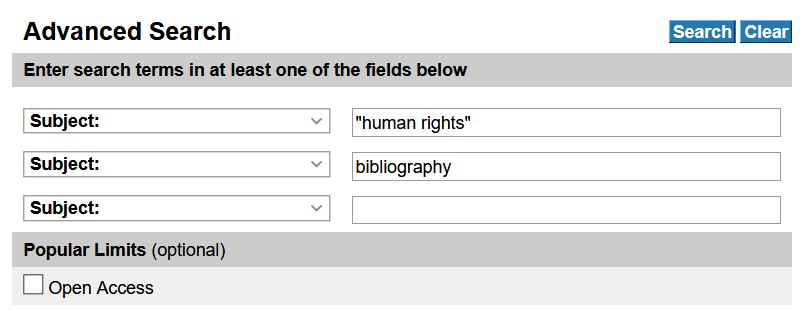
Performing a specific, advanced search, for the authorized subject terms "human rights" and bibliography, returns a more specific set of results. Add a third specific subject term such as "protest movements" to narrow the results further. Clicking on one relevant book's subject heading will lead the researcher to a number of other books that share the same subject term. This search process may be repeated in any library catalog. This type of specific search may be the most economic use of time when researching in a rush.
Example Subject Headings
Droits de l'homme -- Bibliographie
Droits de l'homme -- Répertoires
Human rights -- Bibliography
Protest movements -- Bibliography
Resource Guides by Other Institutions
Comparative Human Rights, Refugee, & Asylum Law: A guide to Human Rights resources produced by University of Michigan’s Law Library. Provides generalized lists of internationally focused resources, lists of texts and treaties, refugee and asylum law resources by global region, UN resources, a list of relevant journals and yearbooks, and other useful search tips.
Dag Hammarskjöld Library of the United Nations: The "Resources" tab at the bottom of the left-side menu directs users to a resource guide to human rights documents. The UN Library & Archives, Geneva, also provides the Human Rights Timeline -- a guide to the official documents demonstrating human rights development over time. UN resources and search tips are discussed in detail, further down in this section of the resource guide.
Human Rights & Refugee Law: Research guide including primary and secondary resources, published by University of New Mexico. It details international HR and refugee law resources, databases, and courts and tribunals.
Library of Congress in Washington, DC: Provides a variety of foreign and international law research guides. Featured country guides include Egypt, Israel, and Lebanon, among others. Other subject guides, such as the Personal Status Laws in Arab Countries guide "identifies personal status laws in Algeria, Egypt, Iraq, Jordan, Kuwait, Lebanon, Morocco, Qatar, Syria, and Tunisia, as well as in territories governed by the Palestinian Authority." And finally, the Islamic Law bibliographies, list "English-language books and articles within books that discuss Islamic law," from 2003 to 2008 and from 2009 to 2014.
Yale's Project Diana: Human Rights Cases: Links to international legal cases; part of Yale’s “The Avalon Project: Documents in Law, History and Diplomacy”
Subscription Databases
Databases are a virtual gold mine for current as well as historical research. The journals and other documents, such as dissertations, that are indexed will in many cases provide the full text. Those that do not provide full text will indicate that they are bibliographic--or indexes--only, usually in their title. You may find which databases your university subscribes to by going to your library’s website or catalog. Contact your librarian for help finding the appropriate resources.
The databases a university library subscribes to can usually be found on the library’s website or Online Public Access Catalog, under a “research” or “resources” tab, and may be searchable by subject or alphabetically.
Howard University provides an alphabetical list of all databases and also separate lists organized by subject. SMU provides a page where students may browse databases by subject or search by title.
Other universities represented in the International Youth Summit are American University of Madaba (Jordan), Ahfad University for Women (Sudan), and University of Jordan.
Some Ideas for Relevant Subscription Databases
Gale: Academic OneFile and Gale In Context are two examples of Gale databases that your university may subscribe to; they have human rights-related content.
EBSCO: Arab World Research Source; EBSCOHost (available at Howard University and SMU; Middle East and Central Asia Studies; or Humanities International Complete would be good resources to check.
EBSCO also provides some Open Access resources, of special interest might be their OpenDissertations database. One example search for: human rights and (middle east OR arab) provides 81 results.
HeinOnline: Often subscribed to by law libraries, this database provides unique access to historical and government documents, legal periodicals, and academic journals.
JSTOR: Provides access to millions of resources including scholarly journals, books, and primary resources. Check to see if your university subscribes, and you may find thousands of relevant resources.
ProQuest: Middle East & Africa Database; Criminal Justice Database; Index Islamicus; Social Science Database; Statistical Abstracts Collection or Statistical Abstracts of the World--these provide access to compendia from more than 60 countries and international government organizations, and contain thousands of socioeconomic tables that are translated to English (if needed).
(Pro tip: When searching for a specific phrase, it often helps to put that phrase in quotation marks.)
Open Access (OA) Databases & Other Resources
Department of State Country Reports on Human Rights Practices: The US State Department’s annual Country Reports on Human Rights Practices, commonly referred to as the Human Rights Reports, cover internationally recognized individual, civil, political, and worker rights, as set forth in the Universal Declaration of Human Rights and other international agreements. They are available online via the State Department website. Drop-down menus on the right side allow researchers to access all reports, from 1999-current. (As of January 2021, the most recent report is 2019, and clicking any report that predates 2016 will redirect the user to the archived webpage.)
Directory of Open Access Journals (DOAJ): This handy database provides a list with links to OA journals on a wide range of topics. Users may perform a keyword search for specific journals, or for articles from any journal included in the database. The search for “human rights” returns 52 indexed journals on that topic, and more than 11,000 articles.
EBSCO: As mentioned above, provides some OA resources. Of special interest might be their OpenDissertations database. One example search for: human rights and (middle east OR arab) provides 81 results.
The European Union (EU) Open Data Portal: The EU, like the United Nations, has many OA resources which are discussed in more detail along with search tips, below. The Open Data Portal allows users to search and access open data published by EU institutions and bodies. Users may also browse datasets by subject or by data type. The Portal provides access to geographic, geopolitical and financial data, statistics, legal acts, crime, and more. Similarly, the EuroStat statistics database is another good resource.
FinDoc: Bibliographic database of human rights literature, located in Finland. Includes international and national documents.
Nonprofit Organizations
Amnesty International: This organization fights human rights abuses, and publishes a number of articles on the topics. Browse their definitions and view related resources through the topics under “What We Do,” including Detention, Refugees, Asylum-Seekers and Migrants; and more.
Arab.org NGO Directory: Lists civil society organizations (CSO's)--either non-governmental or non-profit organizations--operating in the Middle East and North Africa. Search the directory, or browse CSO's by country or area of focus.
Doctors without Borders: Providing medical aid in countries that need the most help, this nonprofit’s project reports and other articles such as those published in ALERT Magazine may provide unique insight into refugee or minority treatment and medical needs.
Euro-Mediterranean Foundation of Support to Human Rights Defenders (EMHRF): This organization’s focus is the South-Mediterranean region, including Morocco, Algeria, Tunisia, Libya, Egypt, Israel and the occupied Palestinian territories, Jordan, Lebanon and Syria. Their Resources page provides access to annual reports and studies, among other documents.
*The European Union and United Nations both have several open access databases (as well as subscription, or paid resources) that are featured under their respective sections, below.
Freedom House: This organization focuses on topics including democracy, equality and human rights, freedom of assembly, and other human-rights topics. View their Publication Archives for past reports and other documents.
Human Rights Watch: This well-known name in human rights work publishes Reports on a variety of topics, searchable by keyword or filter for specific countries, as well as publication date. Another option is to view their archive of World Reports, dating back to 1989.
Islamic Relief USA (IRUSA): Founded in 1993, this nonprofit has a variety of projects, including refugee aid, women’s programs, and more. Most of their website focuses on donation requests for the different projects, however the Press Releases page includes an archive dating back to 2004, and may provide useful information for researchers.
European Union Resources
The European Union (EU) works in a number of fields that are related to human rights. 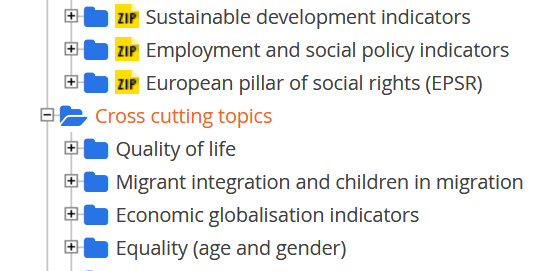 Information about their projects is available here, including human rights & democracy, humanitarian aid and civil protection, and more.
Information about their projects is available here, including human rights & democracy, humanitarian aid and civil protection, and more.
Find EU Official Documents; organized by Parliament, Council, and other EU bodies, these documents include annual reports on European External Action Service activities dating back to 2011. Other EU reports, and the EuroStat statistics database on a range of topics--including migrant integration, may also be found via the Official Documents page.
The EU Open Data Portal provides access to geographic, geopolitical and financial data, statistics, legal acts, crime, and more.
EUR-Lex (EU Law): Search the EU's legal documents by keyword or phrase using the Quick Search bar at the top, or choose Advanced Search, to specify specific criteria. Choose collections of EU law and case law, or national law and case law, among other categories such as author, date, or by publication information--including documents published in the Official Journal.
In addition to legal documents, users will find on this website the Official Journal (OJ) of the European Union--"the main source of EUR-Lex content. It is published daily (from Monday to Friday regularly, on Saturdays, Sundays and public holidays only in urgent cases) in the official EU languages." Search the OJ by date, Series (Information and Notices, or Legislation), Class (Supplement A or I), or number. All issues available from the first, dated December 30, 1952, to the most current (2021).
United Nations Resources
The UN’s human rights work is carried out by a number of bodies. When researching human rights issues, researchers will do well to keep in mind the differences between Charter-based and treaty-based human rights bodies. The Resources tab at the bottom of the left-side menu directs users to a Dag Hammarskjöld Library resource guide to human rights documents. For search tips, please scroll to the last part of this (UN Resources) section.
Where to find UN human rights treaties: The Dag Hammarskjöld Library provides a quick answer in the FAQ to where to find HR treaties.
UN Global Issues page lists topics with basic information, including human rights, gender equality, and refugees.
The Office of the High Commissioner for Human Rights (OHCHR)
The OHCHR is the leading UN entity on human rights. Their website allows the public to search human rights by country, and provides human rights reports, archived and current news, treaties, ratifications, and more. Searchable by map or drop-down list of countries. Their Publications include reports, fact sheets, policy materials, and legal reference works. Search the OHCHR Library, and Databases, here. HRC Documents and Resolutions provides documents and sessions, and includes annual reports.
View information about the Human Rights Council (HRC) and its subsidiary bodies.
List of OHCHR offices in the field, organized by region.
OHCHR also provides a list, with links, of their Core Instruments for human rights.
UN & OHCHR Databases
OHCHR Anti-discrimination Database: “Search for information, policies and measures taken at the international, regional and national levels to combat racism, racial discrimination, xenophobia and related intolerance.”
OHCHR Universal Human Rights Index: “Access country-specific human rights recommendations and information emanating from international human rights mechanisms in the UN system: the Treaty Bodies, the Special Procedures and the Universal Periodic Review (UPR).” The index allows users to explore observations and recommendations made by the “three key pillars” of the UN’s human rights monitoring system: “the Treaty Bodies established under the international human rights treaties as well as the Special Procedures and the Universal Periodic Review (UPR) of the Human Rights Council.” Follow this link for search tips.
For the full list of OHCHR databases, click here.
UN Databases, full list. The most relevant databases may include...
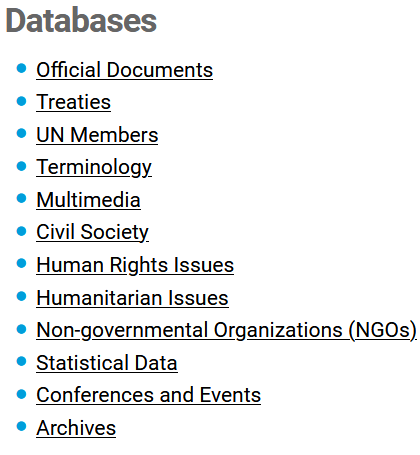 UN Archives: Search or browse UN documents dating from its founding in 1946 to present. The scope of the archives covers four broad areas: the Secretaries-General, Secretariat Departments, Peacekeeping Missions, and Predecessor Organizations.
UN Archives: Search or browse UN documents dating from its founding in 1946 to present. The scope of the archives covers four broad areas: the Secretaries-General, Secretariat Departments, Peacekeeping Missions, and Predecessor Organizations.
Refworld: Reports and documents relating to refugees.
ReliefWeb: Global hub on humanitarian emergencies and disasters.
Integrated Civil Society Organizations System: List of civil society organizations and online registration.
UNdata: Statistical resources of the UN System.
UN Population: International, regional and national population information from UN sources.
There Are Three UN Library Options
Digital Library: Search materials published by the UN including Documents and Publications - reports, legal cases, and more; Images and Sounds; and UN bodies/entities.
iLibrary: Global search and document reader for digital content created by the United Nations. While some documents and ebooks are fully available without subscriptions, others published in the iLibrary require subscription access via EBSCO, ProQuest (Primo), Summon, or WorldCat. Contact your local librarian for help.
Books and documents in the iLibrary cover topics such as Democracy and Governance, Human Rights and Refugees, Migration, Population and Demography, Public Health, Women and Gender Issues, among others. To view the documents within the iLibrary, click on the desired  search result. If it is openly available, a "Reader" button will appear to the right of the metadata within the item record. Clicking that button will open the document.
search result. If it is openly available, a "Reader" button will appear to the right of the metadata within the item record. Clicking that button will open the document.
Once inside the document reader, it may be read or browsed naturally, or search the document for your desired term by using the search bar within the reader.
(Pro tip: clicking Advanced Search lets you make more complicated queries of specific fields and combine search terms with Boolean operators, to target more relevant information. WIth the advanced search, you can search all text or limit the search fields to article or publication title, author, affiliation, article abstract, or ISBN/ISSN/DOI. Filter search results using the left-side menu.)
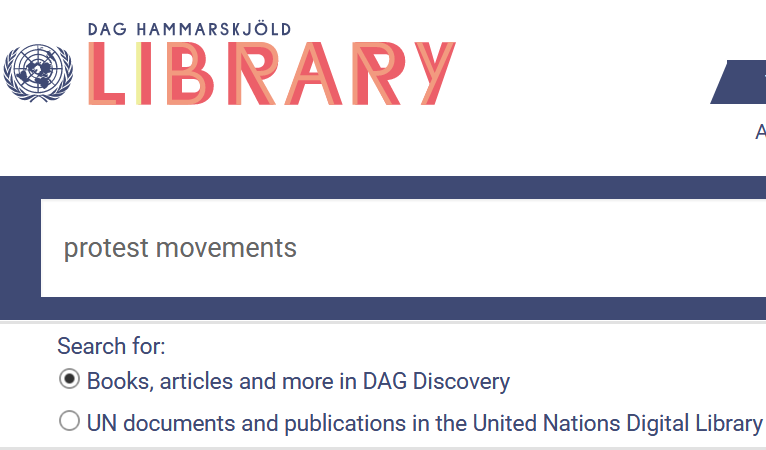 Library: Users may choose to search the library for books and more in the DAG Discovery--digital resources available online, or UN documents and publications--held in the library or downloadable online.
Library: Users may choose to search the library for books and more in the DAG Discovery--digital resources available online, or UN documents and publications--held in the library or downloadable online.
Search Tips for UN Databases & Documents
All library search results may be filtered or refined (after the initial search) by narrower topic, publisher, or publication date. Results may also be sorted by relevance or publication date. Look next to the search bar or on a side menu of search results for these options.
Searching UN resources will be made easier by first checking the UNBIS Thesaurus to find out what their preferred terms are. This will reveal which terms the UN chooses to categorize materials on different topics. Looking up a term in any language will reveal the same term in all the official UN languages.
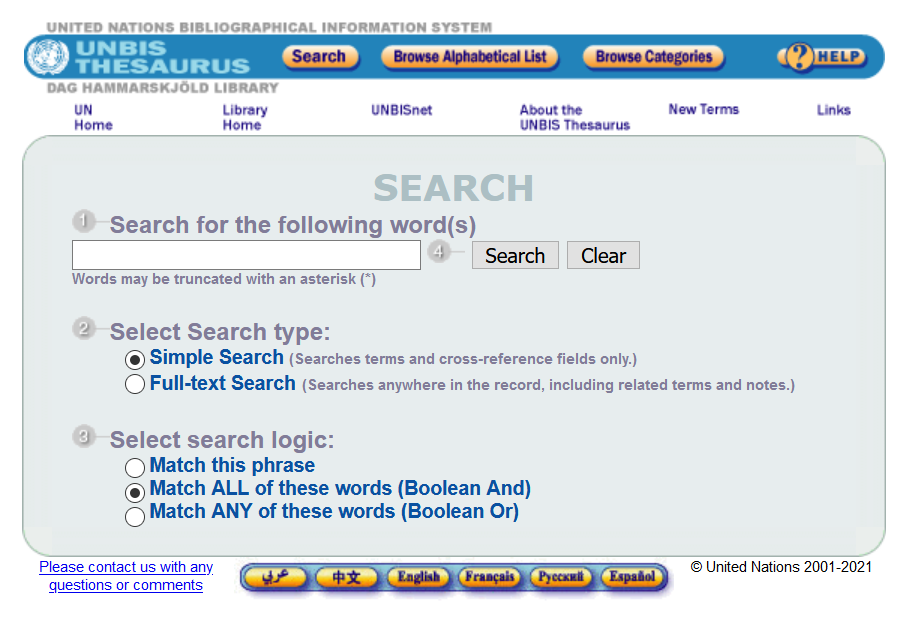
Note on the use of wildcards and preferred terms: A search of the thesaurus for “refugee” and “refugees” will return different results, so to view all possible variants, it is best to use a wildcard * (asterisk) to represent variant spellings or pluralizations.
For example: Searching for behav*r will solve the dilemma of behavior vs. behaviour, and a search for refugee* will return 71 different refugee terms used by the UN, while a search for refugee or refugees will return only subsets of the total 71.
Displaced persons is used solely in reference to (used for) internally displaced persons, and Refugees is the preferred term for international cases. Examples include “Refugees,” “Women refugees,” “Child refugees,” “Palestine refugees,” and more.
Human Rights Resources by Country
The ministries and organizations listed below are far from an exhaustive list of what is available. This section provides just some examples of general human rights-focused government institutions. These may be of use, but if you are looking for human rights information on a country or region not represented, these may serve the purpose of providing examples for what kinds of organizations to look for.
Many countries have ministries (such as Ministry of the Interior), departments, or commissions that are tasked with resolving issues of human rights and developing related policies. Lacking a governmental HR organization, a good alternative might be locally-focused international organizations (such as UN or European Union commissions) and locally based nonprofits.
Going directly to those country-specific websites may prove to be crucial information resources for data gathering. If you are interested in a country not listed below, and are having trouble finding information, please contact the librarian--either MEI’s Oman Library (library@mei.edu) or your home university librarian.
Afghanistan Center at Kabul University (ACKU): Collects and provides access to digital and print documents about Afghanistan. The Library holds "the region's most extensive collection of primary resources on Afghanistan." The Digital Collection is searchable by keyword, subject, title, author, date, or collection, and includes books, pamphlets, and newspapers. The library catalog is also searchable and includes some digital resources. Search all Digital Collection and Newspapers through the ACKU DSpace Repository.
Afghan Independent Human Rights Commission (AIHRC): This institution was established by the May 2001 (UN) Bonn Agreement in Afghanistan and subsequent presidential decree. It gained legal support in Article 58 of the Afghan Constitution. Its various programs oversee activities relating to women's rights, HR education, monitoring and investigation, police activities, and more.
Egypt’s State Information Service: Publishes the Human Rights Magazine, and has a considerable amount of information in English as well as Arabic.
Global Alliance of National Human Rights Institutions (GANHRI): GANHRI is an international human rights network with headquarters in Geneva, Switzerland. The link leads to a list that is organized by global region, then alphabetically by country. Users may also want to check out their resources page.
Iraqi High Commission for Human Rights: Founded in December 2008, it is mandated to serve 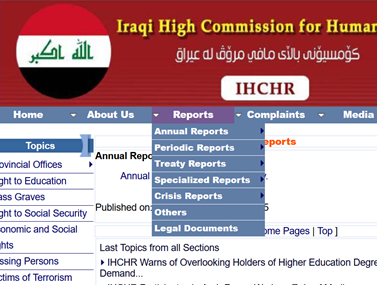 as Iraq’s national human rights institution. Topics include freedom of expression, refugees and IDPs, and women and gender equality. The Reports tab contains legal documents as well as annual, periodic, and treaty reports among others.
as Iraq’s national human rights institution. Topics include freedom of expression, refugees and IDPs, and women and gender equality. The Reports tab contains legal documents as well as annual, periodic, and treaty reports among others.
Iraq’s Ministry of Justice would be a good place to turn for learning about how the criminal justice system works, however the website is only available in Arabic. Current news archives date back to 2015 and جريدة الوقائع العراقية (Iraqi Gazette--available in Arabic only) and its archives, date from 2012 through present.
Lebanese Center for Human Rights (CLHR): A nonprofit, non-partisan organization based in Beirut and founded in 2006. It monitors Lebanon’s human rights situation, “fights enforced disappearance, impunity, arbitrary detention and racism, and rehabilitates the victims of torture. CLDH regularly organizes press conferences, workshops and advocacy meetings on human rights issues in Lebanon and collects, records and documents human rights abuses in reports and press releases.
Turkey Human Rights and Equality Institution: The Turkish website has a lot of information compared to the English site, including the strategic plan for 2019-2023, along with activity other reports under the Stratejik Yönetim (Strategic Governance) tab; under the Yayınlar (Publications) tab there are annual reports, journals, and more. The English version, on the other hand, has almost no information and tabs are mostly empty (however the Reports tab, under Board Decisions does provide two reports from 2019).
Special Topic: Protest Movements & Free Speech
Article 19 of the UN’s Universal Declaration of Human Rights begins with the statement that “Everyone has the right to freedom of opinion and expression,” and Article 20, part 1, announces everyone’s “right to peaceful assembly and association.” Those two distinct rights are often entwined, so users may find searching several different terms to be the most useful method.
Often, when journalists, artists, or other individuals are arrested or imprisoned, free speech or freedom of the press is a central issue. For that reason, users may also wish to view the final section, Criminal Justice/Prison & Detention for more relevant resources regarding freedom of expression.
First check your local/university library before turning to WorldCat when searching for books or other library resources. Any of the following authorized subject terms relating to protests or free speech may be combined with “human rights” to increase the specificity of the search results.
List of Authorized Library of Congress Subject Headings
Assembly, Right of
Riots
Freedom of association
Freedom of speech
Intellectual freedom
Freedom of information
Protest movements
Youth protest movements
Protest camps
MEI Webinar Series: Ten Years after the Arab Spring
Middle East Writers Reflect on the Arab Uprisings: The first Webinar in the series, dated December 14, 2020.
Middle East Writers Reflect on the Arab Uprisings - Featuring Yasmine El Rashidi: The second Webinar in the series, dated February 11, 2021.
Middle East Writers Reflect on the Arab Uprisings - Featuring Khaled Mattawa: The third Webinar in the series, dated February 17, 2021.
Other Related MEI Webinars and Publiations
Protest Movements and Refugee Inclusion in Civil Society: Webinar dated August 21, 2020.
Can Syrian Social Cohesion Survive "without Assad?": Publication dated February 11, 2021.
Protesting against Techno: How a concert revealed the state of Palestinian society: Publication dated January 14, 2021.
Opinion: Yemen's Arab Spring Goals Were Lost. Here's how to bring them back: NPR feature dated February 11, 2021, by Gerald Feierstein--MEI's Senior Vice President and retired ambassador to Yemen.
Special Briefing: The Arab Spring a decade on: Publication dated January 14, 2021.
UN Resources
For finding resources in the UN’s iLibrary, the Library, or the Digital Library, researchers will be better served checking the UN Thesaurus for appropriate search terms. For more on searching the UN, please refer to the Search Tips for UN Databases & Documents section, above.
Some Example Search Terms
From the UN Thesaurus:
Civil and political rights
Academic freedom
Censorship
Freedom of the Press
Civil disobedience
Dissidents
Revolutions
Riots
Freedom of expression
Public demonstrations
Protest movements
Political movements
Peace movements
Political movements
Student movements
Political opposition
Underground movements
Refugee Rights & Inclusion
Resources listed in the Human Rights: General Resources section will not be duplicated here. This section will focus only on targeted resources that deal specifically with refugee matters. It is possible that broad-scope resources described above may contain very valuable information for researchers interested in refugee rights and their inclusion in host societies, however due to the broad nature of the resource it was not included in this section.
MEI Projects, Publications, & Panel Discussions
Displacement and Migration Series: This project will feature webinars, interviews, podcasts, and policy papers discussing the unique challenges faced by displaced people across the MENA region.
Gender and Displacement in the Middle East during Covid-19: Webinar dated August 4, 2020.
Protest Movements and Refugee Inclusion in Civil Society: Webinar dated August 21, 2020.
The Mental Health Costs of Displacement: Webinar dated August 27, 2020.
Biometrics, Refugees, and the Middle East: Better data collection for a more just future: Publication dated August 25, 2020.
Lebanon's Invisible: Refugees, COVID-19, and the Beirut port explosion: Publication dated August 19, 2020.
Search for Books by Subject in Your Library
Subject terms may be as broad or as specific as you need. They may be combined with other terms, such as "human rights" or "Middle East," or used on their own. While simple keyword searches work, targeted searches provide more precise results. Some examples for Library of Congress Subject Headings relating to Refugees, rights, and inclusion, are:
Africa, North (used for the region, "North Africa")
Arabs--Europe--Social conditions
Immigrants (used for "migrants")
Human rights--refugees*
Refugees--Civil rights
Refugees--Europe
Refugees--Arab countries
Immigrants--Europe
Immigrants--Government policy--Europe
Immigrants--Social conditions--Africa, North
Immigrants--Social conditions
Immigrants--Health and hygiene
Immigrants--Health and hygiene--Europe
Refugees--Health and hygiene--Europe
Europe--Emigration and immigration--Government policy
Migrant agricultural laborers--Social conditions
Migrant labor--Arab countries
North Africans--France
North Africans--Mental health--France
* The appearance of "--" in the example subject terms should not be typed into a subject or keyword search. Combine terms into different search boxes or the full term, without dashes, into the same search box. For example, Refugees--Europe becomes simply Refugees Europe or typed into separate boxes, for the same results.
Nonprofit Organizations
Migration Policy Institute: A nonprofit examining migration policies at national and international levels. Browse their areas of focus or click the Research Initiatives tab to view topics including Immigrant Integration, among others.
Nordic Monitor: This non-profit organization "aims to raise awareness on radical and violent extremist trends in Europe and beyond, with a specific focus on patterns that may very well disturb and disrupt social peace, harmony and community integration." Their publications relating to refugees or migrants tend to focus, as its mission implies, on the effects of migration on Europe, as well as Turkey's role in the current situation.
Refuge Egypt: Nonprofit that serves refugees, migrants, and asylum seekers, mostly from other African countries that are living in Egypt due to war or disaster, and who fear returning to their home countries for fear of persecution or loss of rights.
Open Access Databases & Other Resources
The Budapest Process Secretariat: Part of the ICMPD (below), the Regional Coordinator for the Silk Routes Region facilitates "an inter-regional dialogue on migration and the concrete actions implemented under [ICMPD Budapest Process] umbrella through the projects Improving Migration Management and Integrated Border Management" in the region.
Directory of Open Access Journals (DOAJ): Find journals on the topic of refugees or migration, or search for articles with those keywords.
European Union and United Nations databases, and other resources relating to refugees, are listed in their respective sections, below.
Forced Migration Review (FMR): This Open Access journal is indexed and searchable in the DOAJ, or browsable by issue title on the FMR website. It was first published in 1987 as the Refugee Participation Network pamphlet.
The International Centre for Migration Policy Development (ICMPD): Focuses on regions that connect with Europe, and aims to "create efficient cooperation and partnerships along migration routes."
International Organization for Migration (IOM): Provides researchers with the Migration Data 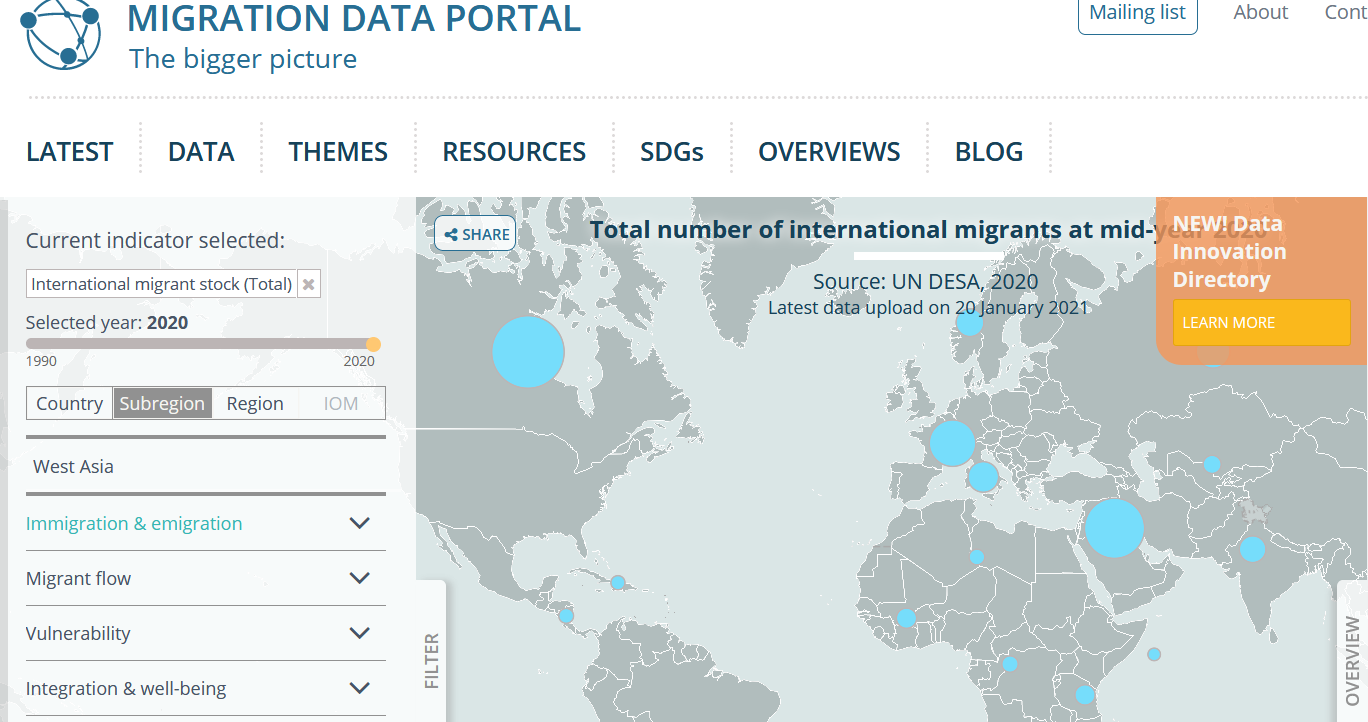 Portal, provides an interactive map and is searchable by country, subregion, region, or IOM region; the Data Analysis Centre, which provides fact sheets and reports; and other Publications. For IOS regions in the Migration Data Portal, “West Asia” is the term for the subregion between Bulgaria and Egypt on the western side, and Iran on the east, including the Arabian Peninsula.
Portal, provides an interactive map and is searchable by country, subregion, region, or IOM region; the Data Analysis Centre, which provides fact sheets and reports; and other Publications. For IOS regions in the Migration Data Portal, “West Asia” is the term for the subregion between Bulgaria and Egypt on the western side, and Iran on the east, including the Arabian Peninsula.
IstanPol: Istanbul Political Research Institute, or IstanPol, is available both in Turkish as well as English, although some reports are only available in Turkish. Some relevant publication summaries are listed here; the link for the full text of the report (PDF) is available to download via the summary page.
The Attitudes Towards Syrian Refugees in Istanbul
A Perception Research: Syrian "Ghost" Kids in the Journey to Istanbul
US Library of Congress Law Library: Provides a report in the form of a downloadable PDF, near the top of the page, describing refugee law and policies in 22 countries as well as the European Union. Among other topics, the surveys review the different types of aid provided to asylum seekers, such as housing, food, medical care access, education, legal rights, and more. Specific countries discussed include Egypt, Jordan, Israel, Italy, France, Germany, Lebanon, and Turkey.
Refuge: Canada's Journal on Refugees: This OA journal was founded in 1981, publishes articles in English and French, on a variety of themes relating to forced migration. Search or browse the journal by issue title, on its website. Or search for specific articles in DOAJ.
European Union Refugee Resources
CEAS (Common European Asylum System): Development of CEAS began in 1999 when Europe began to see an increase in asylum seekers. Their legislation and policies cover asylum procedures; reception conditions, such as housing, etc.; qualification directive, which lays out the grounds for asylum-granting decisions; and more. The CEAS e-Library is searchable by keyword and document type, and provides researchers with downloadable documents. Library of Congress Law Library also provides a detailed report on CEAS.
European Border and Coast Guard Agency (Frontex): The site menu demonstrates the various resources that might be of use to a researcher investigating refugees in Europe, providing key documents which are searchable by category: an interactive Migratory Map; descriptions of migratory routes; press releases; a description of the application process for public access to official documents; and links to downloadable general documents, and research.
EU Fundamental Rights Agency: FRA works to ensure that the rights, values, and freedoms laid out in the EU Charter of Fundamental Rights are protected. On their website, users are able to search their Register of Documents for reports, agendas, and decisions, among other items; and find the EU Minorities and Discrimination Survey.
Migration & Home Affairs--Legal Migration and Integration: The EU's policy for legal migration and integration is currently under development, according to the webpage, where users will find links to other related topics, including legislation and documents, the policy for response to irregular migration, integration, and much more.
RDDP: Regional Development and Protection Programme (RDDP) for refugees and host communities in Lebanon, Jordan, and Iraq, was a four-year project spanning from 2014 to 2017. Resources are available in English, French, and Arabic, with more budgetary information available in French and Arabic; program objectives included ensuring refugees have "durable" solutions available to them, and to support socio-economic development in host countries for the benefit of both host and refugee populations. An interactive map allows users to zoom in and select different projects within the RDDP program.
Please refer to the General EU resources section for more information on databases and where to find documents on a variety of topics.
United Nations Refugee Resources
The resources featured in this section are organized in alphabetical order as they have been in the rest of the guide up to now, however in this case, researchers are presented first with some introductory resources:
Refugee Facts and Statistics: A basic introduction to refugees, in this resource users will find basic information on several topics: refugees; refugee statistics and global trends over time; refugee camps; refugees in America; and World Refugee Day.
Migration: Topical overview and resources list. Including link to IOM's Migration Data Portal, discussed in the databases section, above.
Inside the World’s 10 Largest Refugee Camps: A UNHCR interactive map.
Joint Statement--The EU Pact on Migration and Asylum: Dated September 23, 2020, the page-long Joint Statement of the EU and OHCHR was made in effort to find "common ground on achieving more effective migration governance in Europe, based on the respect and protection of human rights."
Operational Portal--Refugee Situations: This database offers hundreds of documents related to 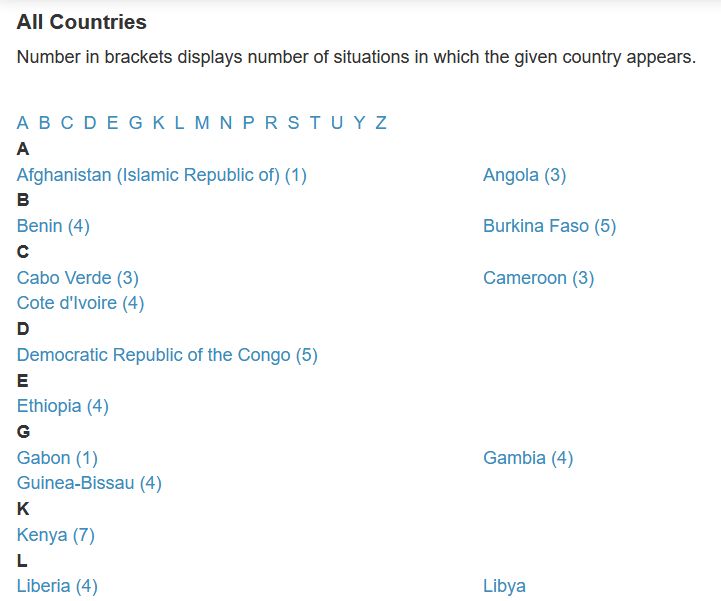 each country, statistics, geodata, reports, and more for all UNHCR countries.
each country, statistics, geodata, reports, and more for all UNHCR countries.
The home page is the "All Countries" tab, although it might appear to be Covid-19 since it is highlighted in red. Researchers will want to scroll down, past the map, to view the alphabetical list of countries featured in the database.
Materials are available in English as well as Arabic. The relevant twitter feeds, displayed on each country’s right-side menu, may also be a good source for up-to-date news and discovery of partner organizations focused on refugee aid.
Researchers may search the Portal based on a number of criteria, including specific location, situation, keyword, and content type. Clicking the "advanced search" button will reveal more search criteria options, including language--materials available in Arabic, Dari, English, Farsi, French, Turkish, and more; partner (organizations); as well as a publication date or date range.
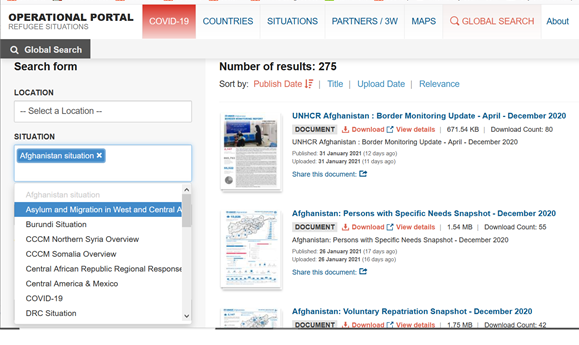
Refugee Statistics: UNHCR Refugee Data Finder, statistical database.
UNHCR Data: Provides data and statistics on refugees. The Statistical Yearbook provides insights into historical trends, volumes date from 2004 to 2016 (2016 was published in 2018).
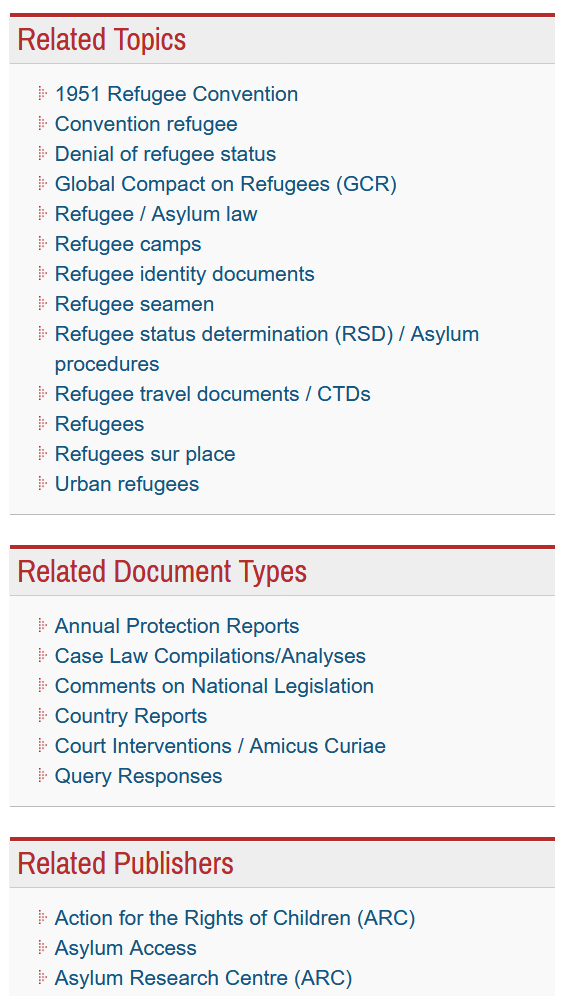 Refworld: Provides reports and documents relating to refugees, and is searchable by keyword as well as country.
Refworld: Provides reports and documents relating to refugees, and is searchable by keyword as well as country.
Search results may be filtered, by typing another desired term in the bar at the top of the page.
The menu on the right side of the search results page will display, based on search terms, lists of Related Topics, Related Document Types, and Related Publishers.
Browse thematic reports by topic--Human rights or Immigration are two examples. Or, browse by publisher.
Refworld also provides access to various document types, including:
Country Information: UNHCR country reports, country profiles and assessments, research papers, and human rights reports from international, governmental, non-governmental sources, and more.
Legal Information: International treaties and agreements, national legislation relating to UNHCR's mandate, and case law from international, regional and national courts.
Policy Documents: Refugee policy documents and guidelines from a variety of sources. UNHCR's position papers relating to specific countries and caseloads are also found here.
Reference Documents: These include reports on IDPs, Asylum Aid documents, annual reports issued by UN agencies, and more.
Please refer to the General UN resources section for more information on databases and search tips.
Government Ministries & Departments
Many countries have ministries, departments, or commissions that are tasked with resolving issues of migration and developing immigration or refugee policies. Going directly to those countries’ websites may prove to be crucial resources for data gathering. Some examples are listed in this section.
Afghanistan High Commission of Migration: Although the website offers versions in English, Dari, and Pashto, many of the English tabs offering information are empty or in Pashto. The commission is under the chairmanship of Afghanistan’s president, and is responsible for providing legal and social services to immigrants and asylum seekers, as well as repatriation services.
Afghanistan Ministry of Refugees and Repatriation: Returnee statistics and reintegration data, IDP statistics, and border crossing point information.
Ministry of Displacement and Migration in Iraq: Available in Arabic, Kurdish, and English, the website mainly provides some news of events as well as some administrative forms and 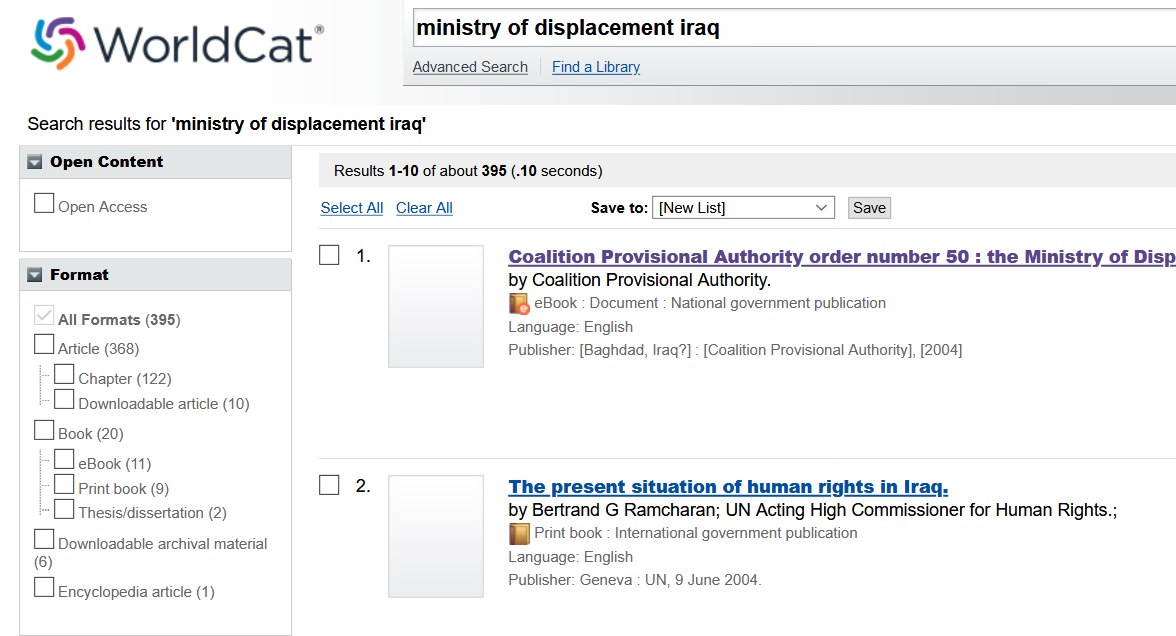 documents. However, a simple keyword search of WorldCat for ministry of displacement Iraq, returns some potentially relevant items, including the ministry's founding document (includes link to PDF). Filter the results by date, publisher, language, or other criteria.
documents. However, a simple keyword search of WorldCat for ministry of displacement Iraq, returns some potentially relevant items, including the ministry's founding document (includes link to PDF). Filter the results by date, publisher, language, or other criteria.
If a certain government ministry or organization shows less than what the researcher had hoped to find on its website, a good place to turn is the university/local library catalog, or a consortium/union catalog, to find what the ministry has historically published, or what others have published about them. For help with finding government publications, contact either your local librarian or the Oman Library, library@mei.edu.
Ministry of Interior, Pakistan: Tasked with internal policies, including immigration policy, visa policy, internal security, and other potentially immigration-related affairs. Documents are downloadable, and performing a CTRL+F search for “refuge” or “migra” (to view all occurrences of immigrant/migrant/migration) will reveal government policies and actions discussed in the documents. Another good resource for Pakistan is UNHCR Pakistan.
Gender Equality
Resources listed in the Human Rights: General Resources section will not be duplicated here. This section will focus only on targeted resources that deal specifically with gender equality. It is possible that broad-scope resources described above may contain very valuable information for researchers interested in gender equality issues, however due to the broad nature of the resource it was not included in this section.
MEI Projects, Publications, & Panel Discussions
Gender and Displacement in the Middle East during Covid-19: Webinar dated August 4, 2020.
Algeria: War against Women: Publication dated February 28, 2021.
Gender Politics in Oman: Between state, sect, and tribe: Publication dated September 8, 2020.
Let Justice Be Done: Respect for female land rights in the Middle East and North Africa: Publication dated December 28, 2020.
Temporary Marriage in Iran and Women's Rights: Publication dated January 14, 2021.
Search for Books by Subject in Your Library
Subject terms may be as broad or as specific as you need. While simple keyword searches work, targeted, subject searches provide more precise results. Combine conceptual terms with location specifiers to limit results to a specific region or nationality. Some examples for relevant Library of Congress Subject Headings are:
Equality before the law
Equality before the law--Middle East
Family violence (used for Domestic violence)
Sex discrimination
Sex discrimination--Middle East
Sex discrimination against men
Sex discrimination against women
Women, Arab
Women--Education--Middle East
Women--Employment--Africa, North
Women in public life--Middle East
Women--Legal status, laws, etc.--Middle East
Women--Legal status, laws, etc.--Africa, North*
Women--Middle East--Social conditions
Women--Middle East--20th century
Women--Employment--Africa, North
Women's rights--Africa, North
Women's rights--Egypt*
Women--Afghanistan--Social conditions
Women's rights--Afghanistan--Social conditions
Women--Health & welfare
Women--Health & hygiene--Middle East
Women--Health & hygiene--Morocco
Minority women--Health & hygiene--Europe
*Country names provided are examples--users may replace them with any country name. For regions, however, authorized subject headings follow the format displayed.
Nonprofit Organizations
The Borgen Project: This nonprofit's mission is to fight extreme poverty. Projects are global and users will find a number of blog posts on topics relating to women's rights in the MENA region.
Equality Now: A global nonprofit, working towards legal equality for women, an end to sex trafficking and sexual violence, and ending harmful practices. They publish reports and among other documents, under the Resources tab.
Human Rights Careers: Provides a list of 25 Organizations Fighting for Gender Equality.
Mental Floss: Provides a similar list of 15 organizations worldwide, fighting for equality.
Women Now for Development: Focused on improving the lives of Syrian women; find project information, press releases, and reports on their website.
Open Access Databases & Other Resources
DOAJ: Featured in the General Resources section in greater detail, returns nine results for a journal search for a keyword search: gender equality.
Women, Peace, and Security Index: Georgetown University's Institute for Women, Peace and Security, and the Peace Research Institute of Oslo, work together to provide an international index measuring of women's well-being and their empowerment in homes, communities, and societies. Scroll down the page to download the 2017/18 and 2019/20 data and reports.
European Union and United Nations databases, and other resources relating to gender equality, are listed in their respective sections, below.
European Union Gender Equality Resources
Justice and Fundamental Rights--Gender Equality: Provides information on the EU's policies on a number of issues: labor market and work-life balance, equal pay, political and economic decision-making equality, gender-based violence, promoting women's rights and gender equality beyond the EU, and partner groups/organizations for projects. Learn about the Gender Equality Strategy 2020-2025, and view or download the plan document.
Please refer to the General EU resources section for more information on databases and where to find documents on a variety of topics.
United Nations Gender Equality Resources
UN Development Programme: Publishes Human Development Reports and hosts the Human Development Index--a searchable database.
UN Women: Focuses on "areas that are fundamental to women’s equality," to enable progress on local and global levels. Activities and projects include leadership, economic empowerment, governance and national planning, and more.
Please refer to the General UN resources section for more information on databases and search tips.
Government Ministries & Departments
Arab Women Organization (AWO): This intergovernmental organization, affiliated with the League of Arab States, has several objectives, including to raise awareness of social, cultural, economic, and legal issues affecting Arab women. Website is also available in Arabic.
Egypt Ministry of International Cooperation: This ministry has put into play several initiatives to encourage gender equality at home and abroad.
Library of Congress (US, LOC): Has published a page with links to several MENA countries' personal status laws and other related materials. Countries listed include Egypt, Iraq, Jordan, Syria, and more.
USAID: Technically, an American government organization, USAID focuses on international development to promote democracy and stability. View their efforts and reports on gender equality and female empowerment in Jordan and in Sudan. To view different countries, in the Where We Work page, select the region and then, on the left-side menu, choose from a list of countries where USAID has programs.
Criminal Justice/Prison & Detention
Resources listed in the Human Rights: General Resources section will not be duplicated here. This section will focus only on targeted resources that deal specifically with criminal justice, detention, and prison. It is possible that broad-scope resources described above may contain very valuable information for researchers interested in these issues, however due to the broad nature of the resource it was not included in this section.
Often, when journalists, artists, or other individuals are arrested or imprisoned, free speech or freedom of the press is a central issue. For that reason, users may wish to refer to the Special Topic: Protest Movements & Free Speech section.
MEI Projects, Publications, & Panel Discussions
A search of the MEI website for postings on criminal justice, prison, detention, or arrest, resulted in nothing overtly devoted to those topics. However, researchers will find that many issues covered by MEI are at least tangentially relevant to criminal justice in general, if not directly affected by it. Search results are often littered with mention of those topics, and mention of an individual or a group's arrest may be found in a number of publications. Performing a CTRL+F search for "arrest" within an article will take users to relevant sections of the publications. The following examples were selected at random from search results for "criminal justice":
"Between Heaven and Earth": A road movie with a mission at a pandemic-era festival: Publication dated September 2, 2020.
Deeds Matter Most: Publication dated November 30, 2020.
Lebanon Joins a Frayed Arab Region: Publication dated February 11, 2021
A Recipe for Intolerance: Iran's blueprint for cracking down on Christians: Publication dated December 9, 2020
Search for Books by Subject in Your Library
Combine subject terms to make a more targeted catalog search.
Criminal justice
Criminal justice, Administration of--Arab countries*
Criminal justice, Administration of--Middle East
Criminal procedure--Africa, North
Correctional law
Criminal law--Africa, North
Indictments
Arrest
Bail
Preventive detention
Searches and seizures
Alien detention centers
Juvenile detention homes--Egypt*
Trials
Mock trials
*Countries/regions listed above are examples and may be replaced with a different country or region.
Nonprofit Organizations
Freedom House: This nonprofit focuses on political rights and civil liberties. Topics include freedom of expression, media freedom, strengthening civil society, among others. Their documents and reports, including the
A search of the Rule of Law Directory, detailed below in the OA Databases & Other Resources section, for the region of focus: Middle East, and if desired--a specification of "civil" in the name--provides a list of organizations focusing on civil rights in the Middle East. While some of the links lead to different websites than the named organization, here are some examples of search results:
Association for Civil Rights in Israel (ACRI): ACRI was founded in 1972 and is a policy driven, nonprofit organization focused on "protecting the human rights and civil liberties of all people living in Israel and the Occupied Territories." ACRI works with the Supreme Court and the Knesset with regards to criminal justice and other civil rights-related topics.
Open Access Databases & Other Resources
DOAJ: Featured in the General Resources section in greater detail, displays 19 search results for journals relating to criminal justice.
International Bar Association: Human Rights Institute (IBAHRI) serves as a resource for legal information and standards. Their resources include international human rights fact-finding Guidelines, journals, committee publications, task force reports, and more.
Manshūrāt Qānūneya (MQ): Created by the American University in Cairo, it is "the first open-access database of its kind to offer a wide variety of primary legal materials in Arabic focused on the Egyptian Legal System." Their goals include raising awareness, aiding in legal research by the public, and enabling law reform efforts by providing access to the necessary information tools. Currently, the database includes constitutional and judicial documents, laws, presidential and ministerial decrees, and reports.
Radicalisation Awareness Network (RAN): A European Union database of participants; the 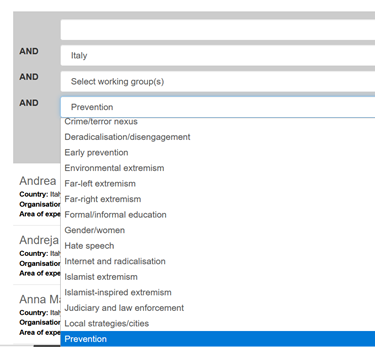 organization itself is discussed in greater detail in the section below. The database is searchable by keyword, country, working group, and area of expertise. As an example, a search for country: Italy--chosen because of the number of migrants arriving on Italian shores; and area of expertise: prevention--chosen at random. The search results provide a browsable list of personal names with information about where they work (Organisation), their email address, country (in this case, Italy), RAN events, and areas of expertise. The goal of this database is to provide interested parties with a person to contact about specific issues, which could lead researchers to valuable first-hand resources as well as open the door to previously unknown organizations and publications. A disclaimer to the database notes that there may be more participants than appear in the database, as some people may not have given explicit consent to be included.
organization itself is discussed in greater detail in the section below. The database is searchable by keyword, country, working group, and area of expertise. As an example, a search for country: Italy--chosen because of the number of migrants arriving on Italian shores; and area of expertise: prevention--chosen at random. The search results provide a browsable list of personal names with information about where they work (Organisation), their email address, country (in this case, Italy), RAN events, and areas of expertise. The goal of this database is to provide interested parties with a person to contact about specific issues, which could lead researchers to valuable first-hand resources as well as open the door to previously unknown organizations and publications. A disclaimer to the database notes that there may be more participants than appear in the database, as some people may not have given explicit consent to be included.
Rule of Law Directory: The International Bar Association's Human Rights Institute provides public 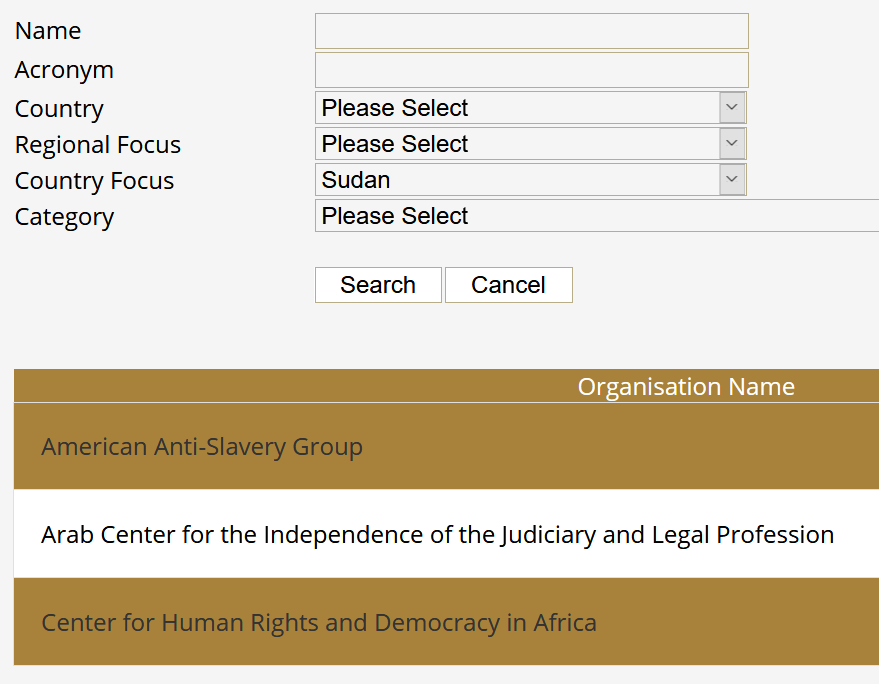 access to the international Rule of Law Directory; a centralized and searchable online database of organizations from around the world. Users may search by geographical location, regional or country focus, and organization name. Or browse the alphabetical list of organization names.
access to the international Rule of Law Directory; a centralized and searchable online database of organizations from around the world. Users may search by geographical location, regional or country focus, and organization name. Or browse the alphabetical list of organization names.
Other European Union and United Nations databases, and other resources relating to criminal justice, are listed in their respective sections, below.
European Union Criminal Justice/Detention Resources
Justice and Fundamental Rights--Criminal Justice: The landing page for European Commission's justice and fundamental rights policies has a number of potentially valuable resources. Including documents on cross-border electronic evidence files; support materials for victims' rights and a 5-year strategy plan for 2020-2025; and more. A simple search of the website for prison returns over 10,000 results, including some from the EuroStat database.
The Radicalisation Awareness Network (RAN): Part of EU's Migration and Home Affairs office, RAN is an umbrella network with the goal of curbing radicalization and violent extremism in Europe. Among the topics found on the website's left-side menu, users will find rehabilitation and prison, along with Publications. RAN also provides a database of network participants. More information on this may be found in the OA databases section, above.
Please refer to the General EU resources section for more information on databases and where to find documents on a variety of topics.
United Nations Criminal Justice/Detention Resources
UN Office on Drugs and Crime (UNODC): Focuses on crime and armed violence prevention, criminal justice reform, and justice for children. Within UNODC, the Justice Section is responsible for helping countries with these issues. This website may be used as a resource for crime statistics, surveys, and more.
Please refer to the General UN resources section for more information on databases and search tips.
Government Ministries & Departments
Egypt: AUC Cairo's Law and Society Research Unit (LSRU) was founded in 2014 and has formal academic cooperation agreements signed with the Egyptian State Council, the Ministry of Justice and the Bar Association.
Judiciary: Egypts justice department provides the Arabic and unofficial English translations of the Criminal Procedures Code; Terrorist Entities Law; Protest Law; and (English only) NGO Law of 2002; among other information and documents.
In general, countries publish information about their criminal justice systems and laws via their judiciary ministries. Here are just a few links to some countries' ministries:
Jordan
Lebanon
Sudan
Turkey
United Arab Emirates











